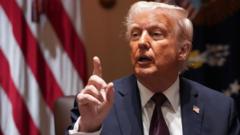President Trump's latest tariffs on auto imports are causing unrest among U.S. allies, prompting reactions ranging from condemnation to consideration of retaliatory measures, amplifying concerns over a potential trade war.
Trade Turmoil: Allies React to Trump's New Auto Tariffs

Trade Turmoil: Allies React to Trump's New Auto Tariffs
The imposition of tariffs threatens international relations and raises questions about America's role in global trade.
President Trump’s recent decision to enforce a substantial 25 percent tariff on imported cars and car parts is creating ripples in international relations, causing significant backlash from America’s allies. The imposition of these tariffs has raised concerns not only about disrupted supply chains but also about the potential for escalating economic tensions globally.
Countries such as South Korea, Japan, Germany, Mexico, and Canada, which are pivotal to America's trade relationships, have expressed serious concerns following this announcement. Canadian Prime Minister Mark Carney categorized Trump’s action as “a direct attack,” highlighting the profound sense of betrayal felt among allied nations that have engaged in longstanding free trade agreements with the U.S.
Japanese Prime Minister Shigeru Ishiba articulated his country’s cautious approach, stating, “We need to consider what’s best for Japan’s national interest,” signaling that Japan is evaluating its response options while weighing potential retaliatory actions. With further tariffs anticipated, the uncertainty surrounding the economic landscape has emerged as a central issue for many national leaders.
The newly introduced tariffs not only pose threats to the automotive industry but also suggest a looming possibility of a global trade conflict. Experts warn that such a trade war could result in a cascade of economic nationalism, ultimately hindering global economic growth and inciting inflation, all while complicating critical negotiations with the U.S. concerning national security.
The Trump administration's approach, which leverages American military power and consumer market advantages to achieve what it deems favorable trade deals, is met with skepticism from economists. Many emphasize the delayed potential benefits of increased domestic auto manufacturing jobs, countered by possible job losses in other sectors.
For nations that have historically counted on American support and partnership, the abrupt pivot in policy signals a dramatic shift and raises doubts about the reliability of the United States as a trade partner, marking a pivotal moment in international relations and trade policy.






















